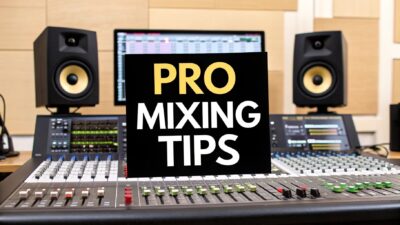At Chordx, we know that crafting memorable lyrics is a cornerstone of great songwriting. Whether you’re a seasoned pro or just starting out, honing your lyrical skills can elevate your music to new heights.
In this post, we’ll share some essential song writing tips for beginners and experienced songwriters alike. From finding inspiration to structuring your lyrics, we’ll cover techniques that will help you create songs that resonate with listeners.
Where to Find Lyrical Inspiration
Songwriting inspiration can strike at any moment, but you often need to actively seek it out. We’ve gathered some practical strategies to help you find inspiration for your lyrics.
Tap into Your Personal Experiences
Your life is a goldmine of songwriting material. Keep a journal to record your thoughts, feelings, and experiences. Write down interesting conversations, conflicts, or moments of joy. These personal anecdotes can form the backbone of relatable and authentic lyrics.
Become an Observer
Train yourself to notice the details around you. People-watch in a busy café, take a walk in nature, or explore a new neighborhood. Focus on the sights, sounds, and smells. These observations can add rich, sensory details to your lyrics, making them more vivid and engaging.
Immerse Yourself in Literature
Read widely to expand your vocabulary and expose yourself to new ideas. Poetry, in particular, can teach you about rhythm, imagery, and concise expression. Write lyrics inspired by a character from a novel or a scene from a short story. This technique can help you step outside your own experiences and create more diverse lyrical content.
Explore Different Music Genres
Listen to genres outside your comfort zone. Pay attention to how different styles approach storytelling, use of language, and emotional expression. Hip-hop often excels at wordplay and social commentary, while folk music frequently features narrative storytelling. Incorporate these elements to add depth and variety to your own lyrical style.
Use Technology to Your Advantage
Leverage digital tools and platforms to spark creativity. Try AI-powered lyric generators like Suno, These Lyrics Do Not Exist, or Amadeus Code for unique word combinations. Use songwriting apps to organize your ideas and collaborate with others. Follow songwriting-focused social media accounts for daily prompts and challenges.
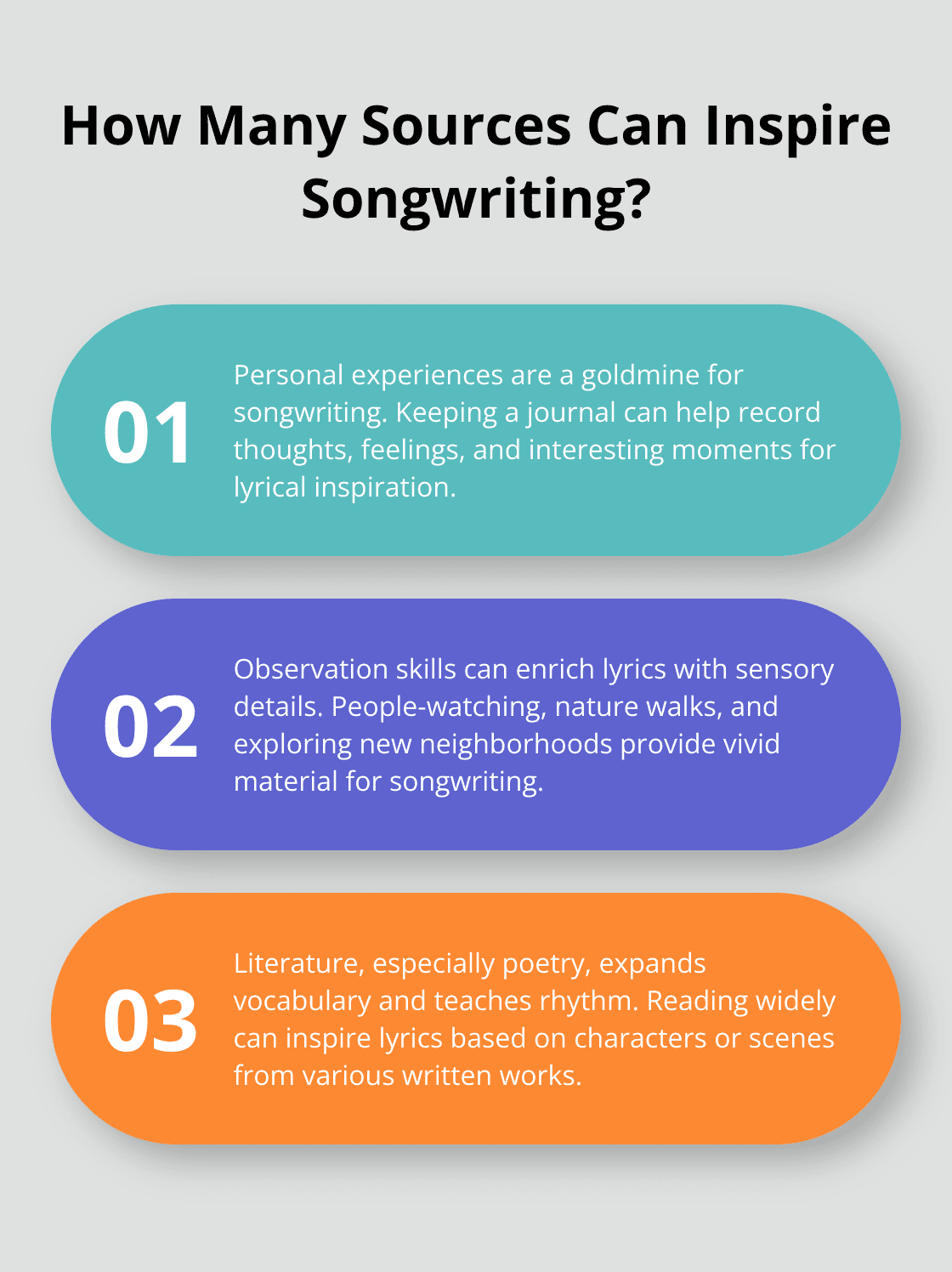
Inspiration is everywhere. The key is to stay open and receptive to the world around you. As you actively seek out new experiences and perspectives, you’ll find an endless well of ideas for your next song. Now that you’ve gathered inspiration, let’s explore techniques to transform these ideas into effective lyrics.
How to Write Lyrics That Stick
Effective lyrics form the foundation of memorable songs. Let’s explore some practical techniques to elevate your lyrical game.
Paint a Picture with Words
Songwriters can improve their titles and connect with their audiences on a deeper level by using descriptive language to create vivid mental pictures. When you write, focus on specific details that appeal to the senses. For example, instead of “It was a nice day,” write “The sun warmed my skin as the scent of freshly cut grass filled the air.”
Master the Art of Metaphor
Metaphors and similes can add depth and complexity to your lyrics. They allow you to express complex emotions or ideas in a relatable way. Instead of directly stating “Love is complicated,” you could write “Love is a maze with no exit.” This technique not only makes your lyrics more interesting but also gives listeners room for interpretation.
Hook Them from the Start
Your opening line is crucial. It’s your first chance to grab the listener’s attention. A strong opening can intrigue, shock, or emotionally charge. Take Adele’s “Hello, it’s me” from her hit song “Hello.” It’s simple yet immediately engaging. When you craft your opening line, ask yourself: Would this make someone want to keep listening?
Craft an Unforgettable Chorus
The chorus is often what people remember most about a song. It should be catchy, easy to sing along to, and encapsulate the main theme of your song. The verses tell the individual parts of the story, while the chorus reminds you of the main point. It should be repetitive; that’s its job.
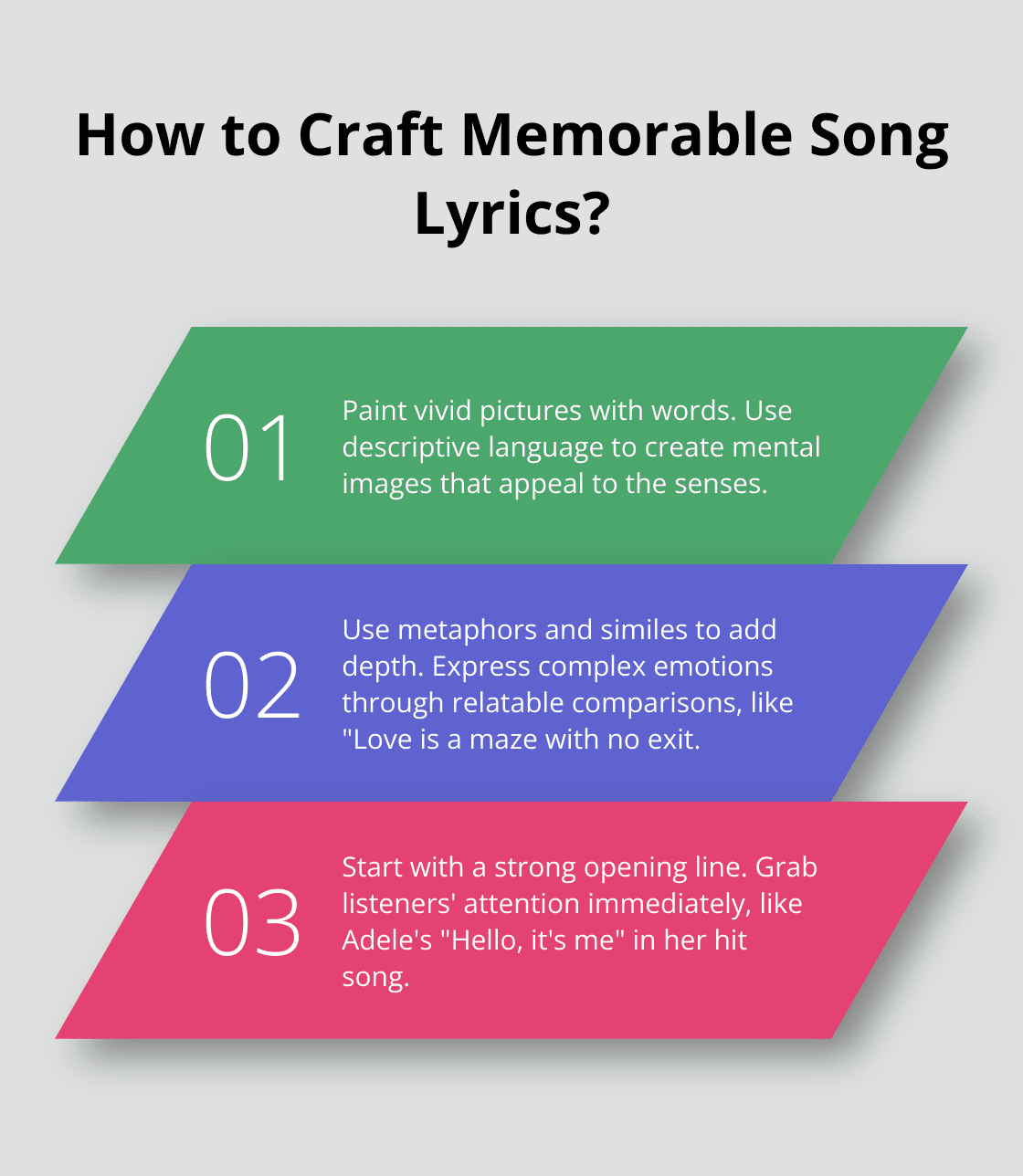
One effective technique is to use a “call and response” structure in your chorus. This involves alternating between two contrasting phrases, which can make your chorus more dynamic and memorable. For example, in the chorus of “We Will Rock You” by Queen, “We will, we will” is the call, and “rock you” is the response.
These techniques are tools, not rules. The best lyrics often come from a place of authenticity and emotion. As you practice these methods, you’ll develop your unique voice and style. Keep writing regularly, keep experimenting, and don’t fear breaking the mold. Your next great lyric could be just around the corner.
Now that you’ve learned how to craft compelling lyrics, let’s move on to the next crucial step: structuring your song for maximum impact.
How to Structure Your Lyrics for Maximum Impact
Master the Verse-Chorus-Bridge Format
The verse-chorus-bridge structure forms the backbone of many hit songs. Verses introduce and develop your story, choruses emphasize the main message, and bridges offer contrast and depth.
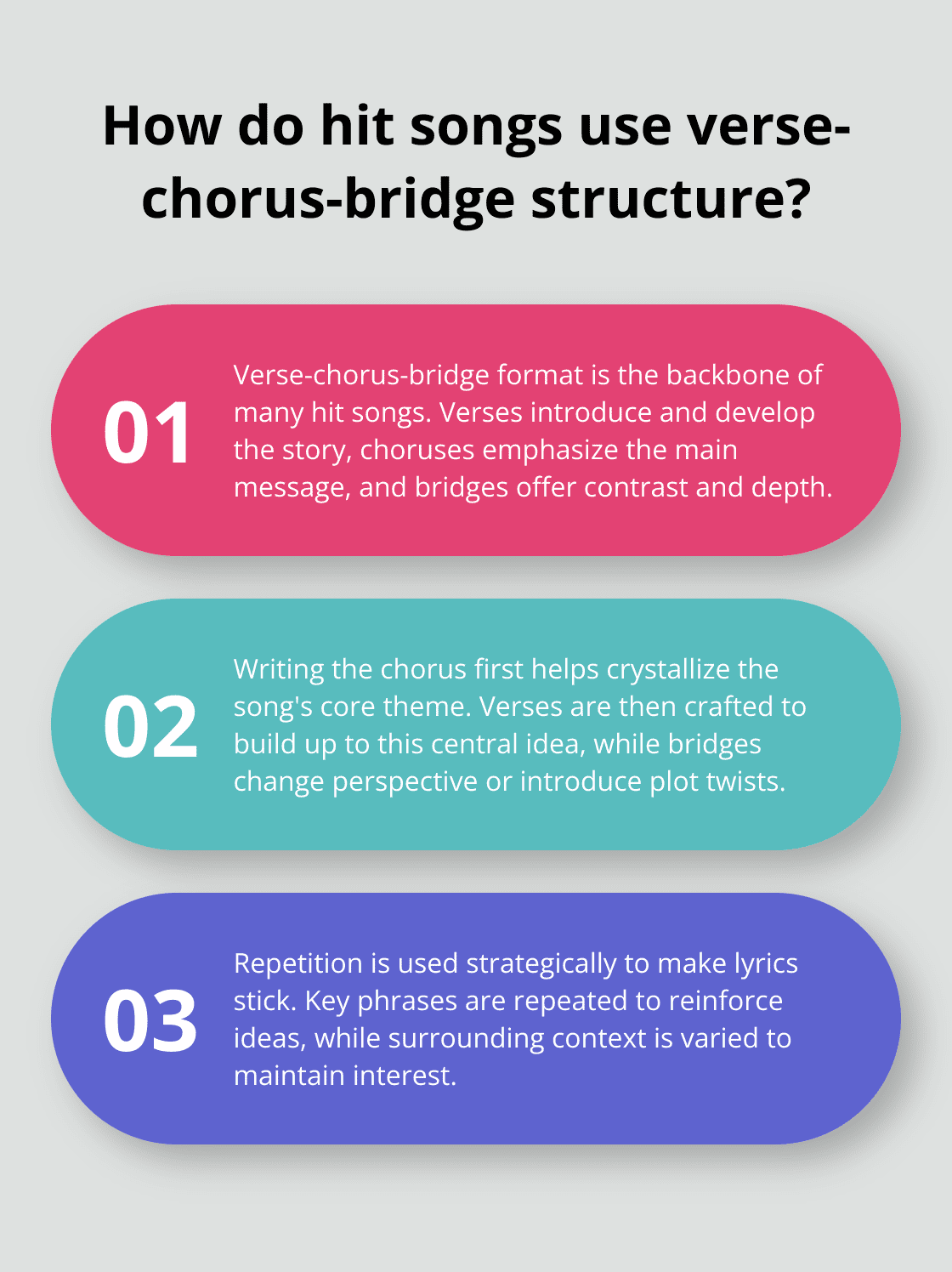
Try writing your chorus first to crystallize your song’s core theme. Then, craft verses that build up to this central idea. For the bridge, change the perspective or introduce a plot twist to maintain listener engagement.
Create a Compelling Narrative Arc
Even non-narrative songs benefit from a sense of progression. Identify the emotional journey for your listeners, then map how each section contributes to this journey.
You might start with uncertainty in the first verse, build tension in the pre-chorus, express a revelation in the chorus, and show growth in subsequent verses. This emotional arc keeps listeners invested from start to finish.
Use Repetition Strategically
Repetition can make your lyrics stick, but requires judicious use. The key lies in balancing repetition with variation. Repeat key phrases to reinforce ideas, but vary the surrounding context to maintain interest.
Consider using a repeating phrase as a refrain at the end of each verse (building anticipation for the chorus). Alternatively, slightly alter repeated lines each time they appear to reflect your song’s narrative or emotional progression.
Experiment with Structure
While traditional structures provide a solid foundation, don’t hesitate to experiment. Try unconventional formats like:
- Starting with the chorus (to grab attention immediately)
- Using a “bookend” structure (beginning and ending with the same verse)
- Incorporating a pre-chorus or post-chorus (to add extra layers to your song)
These variations can help your song stand out and better serve your unique message.
Align Structure with Emotion
Your song’s structure should mirror its emotional content. For intense, high-energy songs, you might use shorter, punchier sections. For more introspective pieces, longer verses allow for deeper exploration of themes.
Pay attention to the natural ebb and flow of your lyrics. Let the emotional intensity guide your structural choices (e.g., building to a climactic bridge or ending on a quiet, reflective note).
By mastering these songwriting skills, you’ll be well on your way to creating impactful and memorable lyrics.
Final Thoughts
Crafting memorable lyrics requires creativity, practice, and self-discovery. We explored various songwriting tips for beginners and experienced writers, from finding inspiration to structuring lyrics for impact. Great songwriting often stems from authenticity and emotion, so trust your instincts and personal experiences.
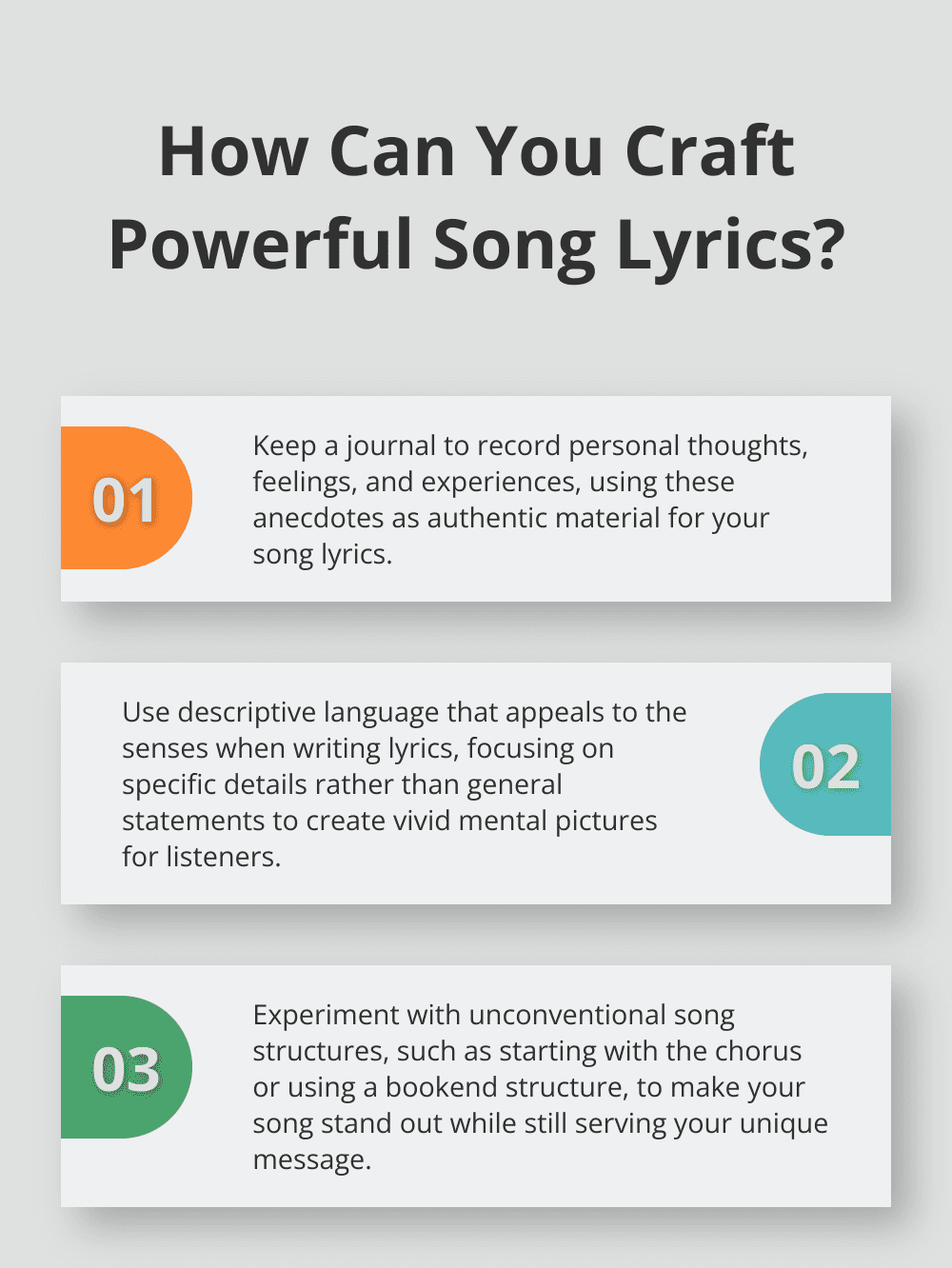
Consistent practice and revision will improve your lyrical skills. Write regularly, even when inspiration eludes you. Don’t fear revisiting and refining your work – many iconic songs underwent numerous revisions before reaching their final form. Push yourself to experiment with different styles, structures, and themes to develop your unique voice.
At james, we support your musical journey through our comprehensive resource hub. We offer expert insights, tutorials, and practical advice to help you create high-quality tracks and advance your career. From articles on popular DAWs to guides on AI tools for music production (and everything in between), we provide the knowledge you need to elevate your songwriting and production skills.


